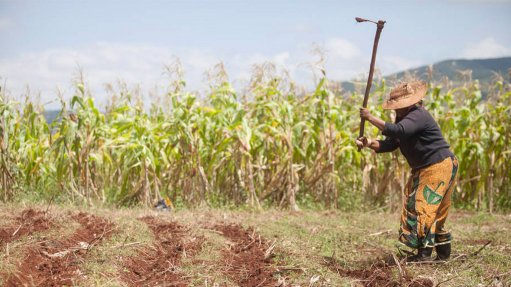
Photo by: UN
The Economic Sectors, Employment and Infrastructure Development (ESEID) cluster, which oversees progress in the implementation of the National Development Plan (NDP), reports that an agripark is ready to be launched in the North West.
Government has committed to developing 44 agriparks across the country’s nine provinces to become catalysts for job creation, promoting growth, rural incomes, investment, output and perhaps exports to other regions on the continent.
Speaking during a media briefing on progress made on the implementation of the NDP, Rural Development and Land Reform Minister Gugile Nkwinti highlighted that production plans had been developed and were being implemented across the country to ensure increased production in the areas supporting the agriparks.
He noted that government would invest over R2-billion each year in the establishment of these agriparks.
The ESEID added that the Department of Science and Technology (DST) was also in the process of completing a feasibility study on agro-innovation hubs that would support the development and dissemination of appropriate technologies to be implemented in agriparks.
To further bolster the rural agriculture programmes, the DST was in the process of establishing a wheat-breeding platform to support the development and commercialisation of new breeding technologies for emerging and commercial farmers.
Five new cultivars would be produced by 2020 to support increased productivity and food security.
LAND REFORM
Agriculture, Forestry and Fisheries Minister Senzeni Zokwana elaborated on government’s land reform plans, noting that his department and the Department of Rural Development and Land Reform were engaged in a programme to ensure that real change was brought forward and that productivity was enhanced.
“We believe that, through land reform, we can absolve the youth and unlock employment, as well as focus on food security,” he said.
Nkwinti added that since government had initiated the land reform programme, it had received encouraging support from all areas. “The Banking Association of South Africa committed to investing R1-billion every year over the next 15 years to assist land reform.”
He pointed out that the Land Bank was also involved, to ensure integrity in the system. “We want to give security to those we are asking to invest. I am convinced that, by 2030, we will have a different rural community in South Africa, with enterprises and industry,” Nkwinti said.
By end-June, the Commission on Restitution of Land Rights had settled claims over 78 138 ha of land from an award of 3.2-million hectares of land acquired at the cost of R18.7-billion.
Some beneficiaries opted for financial compensation, which, to date, had seen the commission pay out over R9.1-billion. An additional R4.1-billion was also awarded to beneficiaries that had opted for land as development assistance.